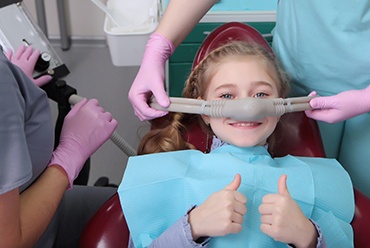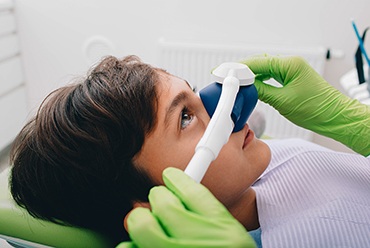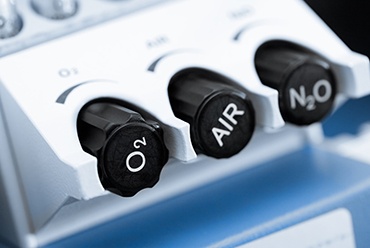Sedation Dentist for Kids – Pickering, ON
Tackling Fears Safely & Effectively
It’s not uncommon for children to feel anxious, fearful, or nervous about visiting the dental office, especially when they’ve had a bad experience in the past. Our team at HiFive Kids Dental & Braces does everything we can to help your little one feel comfortable and create positive experiences that will have them excited to return. If your little one suffers from dental anxiety, give us a call to learn more about how we can help with sedation dentistry for kids in Pickering.
Oral Conscious Sedation
For children with severe dental anxiety or at a very young age, oral conscious sedation can come in handy. Oral sedation involves a “juice” drink that is an anxiety-relieving medication that will help them be more relaxed and allow us to complete dental treatment. A child will be calm but not asleep during oral sedation and should be able to communicate.
Learn More About Oral Conscious Sedation
Nitrous Oxide

Anxiety can be real when it comes to dental visits for children or adults. We here at HiFive Kids Dental & Braces understand these fears and do our best to make our little patients’ visits as comfortable and fun as possible! When children need to have fillings or other types of dental work done, the tell-show-do method is very effective, but we may need additional “anxiety-relieving” techniques to help the child cope with the loud sounds and even sensations of our tools. Nitrous oxide is one of the safest methods we use to accomplish this. Historically known as “laughing gas,” it can help relieve anxiety for many children during dental treatment.
Who Is a Good Candidate for Nitrous Oxide?

Nitrous oxide is one of the safest and mildest forms of sedation available. While it may be difficult as a parent to watch as your child undergoes any type of procedure, you can trust that this solution will help to keep them calm and relaxed during these appointments.
No matter the age of the patient, our team must conduct a thorough examination and discuss your child’s oral and medical health history. This will ensure that they are not taking anything that might interfere with the effectiveness of the nitrous oxide mixture.
If we find that your child suffers from any of the following, there is a good chance they’ll be eligible to receive nitrous oxide:
- Your child is scared to visit the dentist’s office
- They have a highly sensitive gag reflex
- They’re unable to sit still for prolonged periods
- They are fearful of needles
How Does Nitrous Oxide Work?

It is a very safe, effective anxiolytic gas that has no long-lasting effects and even helps suppress the gag reflex for little ones who are prone to gagging. Nitrous oxide will not put your child to sleep - your child will be awake, alert, and able to respond to all verbal communication during treatment.
They may begin to feel slightly warm after they begin to breathe in the nitrous oxide through the nasal mask. It’s also possible that they might begin to giggle, as it’s commonly referred to as laughing gas. Once they start to feel comfortable and at ease, our team will begin our work, ensuring that your child remains free of any pain or fear throughout their appointment.
Aftercare for Nitrous Oxide

The effects of the gas quickly wear off once the treatment is done. Our team will remove the mask and turn off the nitrous oxide, allowing your child to breathe in pure oxygen when it’s all done. After a few minutes, you and your child can walk and talk happily all the way home, as they are unlikely to experience any negative side effects from the sedation.
Sedation Dentistry FAQs
Is sedation dentistry safe for kids?
If your child is frightened about going to the dentist, sedation treatments may be able to help them get the care they need while reducing the likelihood of them developing a dental phobia later in life. The most common form of dental sedation for children is nitrous oxide, but oral conscious sedation methods may also be used in more severe cases of anxiety or for those with special needs. When discussing dental sedation with our pediatric dentist, take care to list any health conditions your child has as well as any medications they are taking. The most common side effect of dental sedation is nausea, but it can usually be avoided by having your child abstain from food and drink before their procedure. If your child is receiving oral conscious sedation, they will need supervision afterward as it can take several hours for its effects to wear off.
Will my child remember anything after receiving dental sedation?
While your child will be awake when receiving dental sedation at our office, they may not be able to remember much of the procedure afterward. This can actually be a good thing since it can prevent children with dental anxiety from developing further unpleasant associations with going to see the dentist. However, nitrous oxide and oral conscious sedation should not result in too much amnesia.
What are the risks of sedation dentistry?
While the treatments used in sedation dentistry are quite safe for most patients, they can present risks to some people due to preexisting conditions or negative interactions with medications they are taking. While every child reacts differently to dental sedation, providing our team with accurate information about your child’s medical history can help us develop an appropriate treatment plan that minimizes risks. The most common side effects of dental sedation that can last for a few hours after the procedure include nausea, headache, and, in the case of oral conscious sedation, grogginess.
Will my child feel any pain with dental sedation?
The dental sedation treatments used in our office suppress the body’s ability to recognize pain while keeping the patient awake. While your child may experience pressure or discomfort during the procedure, they shouldn’t feel any actual pain. Depending on the procedure your child is receiving, our dentist may administer a local anesthetic to prevent pain while they are receiving sedation treatment.
